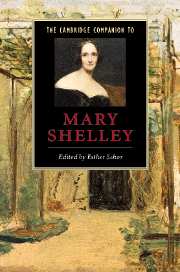16 - Mary Shelley as cultural critic
from Part 3 - Professional personae
Published online by Cambridge University Press: 28 May 2006
Summary
the voice of dead time, in still vibrations, is breathed from these dumb things . . .
(Mary Shelley, The Last Man, III x 336)The word “culture” is a contested term. It hesitates between “nature” and “nurture,” an insoluble conundrum. It can, for instance, mean a corporation's management structures or the medium in which people come to discover their existence. Mary Shelley engaged with varied forms of what we might call “culture.” She worked on the journal The Liberal, a collaboration amongst the Shelley-Godwin-Hunt circle in England and Italy (J II 431). She published at least a dozen essays of the genre that we now call “review essays” and dozens more stories and sketches for the annuals. Shelley also edited and wrote the prefaces and notes to two editions of her late husband's poetry and edited his essays, letters, and translations. In addition to her novels and novella, she wrote poems and plays and translated works from Italian and German. A scholarly edition of her biographies is now available and her travelogues are at last back in print. In all these works, Shelley demonstrated her special awareness and intelligence concerning culture, both specifically as the literary productions and values of her era, and generally as notions of culture as a whole way of life (as the critic Raymond Williams, author of Culture and Society, would have phrased it).
- Type
- Chapter
- Information
- The Cambridge Companion to Mary Shelley , pp. 259 - 273Publisher: Cambridge University PressPrint publication year: 2003
- 5
- Cited by



